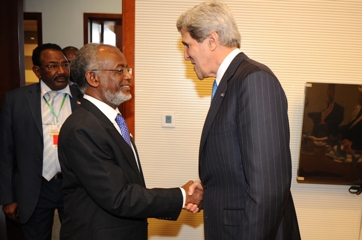Sudanese officials to visit Washington for talks on bilateral relations: sources
February 3, 2015 (KHARTOUM) – Sudan’s foreign minister, Ali Karti, and presidential assistant Ibrahim Ghandour are expected to fly to Washington in two separate but synchronised visits where they will hold talks with US officials, Sudan Tribune has learnt.

President Barack Obama will also attend this year’s breakfast to be held at the Washington Hilton on 5 February.
The Sudanese foreign minister is reported to have privately said that he will meet key congressmen and administration officials for talks on bilateral relations.
However, rebels from the Sudan People’s Liberation Movement-North (SPLM-N) say the timing of these visits is not opportune as Khartoum continues to carry out war in the Two Areas and Darfur where civilians are gravely affected.
Karti is believed to be a staunch supporter of continuing dialogue with Washington. He and Ghandour have also reportedly convinced Bashir to remove his veto against discussions with the US administration on normalising ties last November.
Sudan is on the list of terror sponsoring countries and subjected to harsh economic sanctions. Washington admits Sudan’s cooperation in the fight against terrorism, but attached new conditions related to the end of the conflicts in Darfur, Blue Nile and South Kordofan.
Officials in Khartoum however, insist that issues of bilateral relations should be discussed without interfering in Sudan internal affairs.
GHANDOUR’S VISIT
Sudan Tribune also learnt that Ghandour will also arrive in Washington around the same time.
His program includes meetings with officials at the State Department and the US special envoy to Sudan and South Sudan along with Sudan experts and think tanks.
The national dialogue process and ways to achieve peace and democratic reforms are expected to be at the center of the discussions.
Many European and American officials believe that the idea of national dialogue should be supported despite discouraging signs about its outcome. They believe that this process can lead to a negotiated solution ending war and bringing stability in the east African nation.
Germany, backed by the European Union (EU), is supporting the process and is working closely with the African Union High-Level Implementation Panel (AUHIP). The latter is tasked with the cessation of hostilities and preparation of framework agreement on the dialogue.
Ghandour, who is the chief negotiator for talks with rebels on the conflict in South Kordofan and Blue Nile, will seek to persuade Washington to support their efforts to convince the rebel groups to sign cessation of hostilities agreement and to join the national dialogue.
When reached by Sudan Tribune, the SPLM-N secretary-general and chief negotiator, Yasir Arman, denounced the visit of the two Sudanese officials saying they are invited to visit the US at the time they and their government are “committing gross human rights violations and genocide”.
“Ghandour is one of the architects of the one party election. We should mobilise against this visit,” he said.
On Sunday, the SPLM-N urged mediators and the African Union to put pressure on Khartoum to enforce a roadmap prepared by the AU Peace and Security Council and accepted by the Sudanese government, which aims to achieve a truce in the country’s conflict-affected areas and involve the rebels in the national dialogue process.
Since October 2014, the US special envoy for Sudan and South Sudan, Donald Booth, has said Washington is ready to resume discussions on bilateral relations and how Washington can support efforts for peace and democracy in Sudan.
“We must together chart a course forward. To this end, I reiterate my readiness, and that of my government, to engage the Sudanese in a more frank and frequent exchange, to visit Khartoum, and to discuss the full range of issues that frame our bilateral relationship,” Booth said.
On the national dialogue he said, the process is uncertain and can be an “empty exercise” because of the continuation of war and the restriction of political freedoms and political repression. However, he underlined they support urging Khartoum to create a conducive environment to ensure a successful process.
The special envoy said that Khartoum’s refusal to respond positively to opposition demands had backfired, going on to suggest that the government’s intransigence had actually pushed opposition forces to unite their efforts against the country’s leadership.
In December, the rebel alliance Sudanese Revolutionary Front, the opposition umbrella National Consensus Forces (NCF) and the National Umma Party (NUP)signed a political charter dubbed “Sudan Call” for peace and democracy.
(ST)

